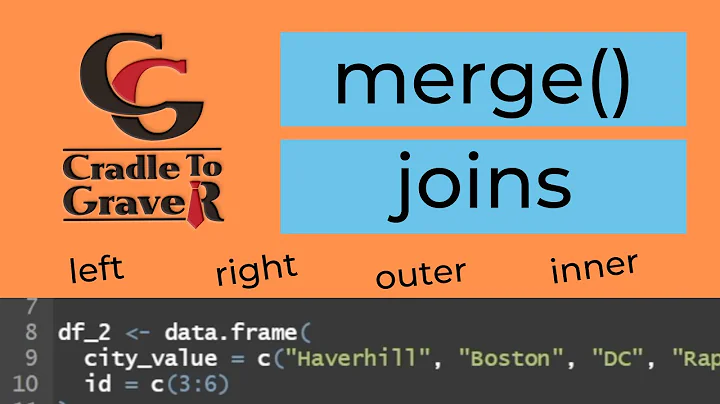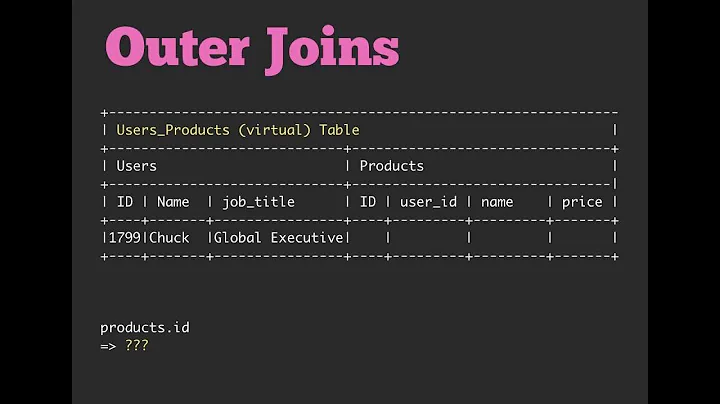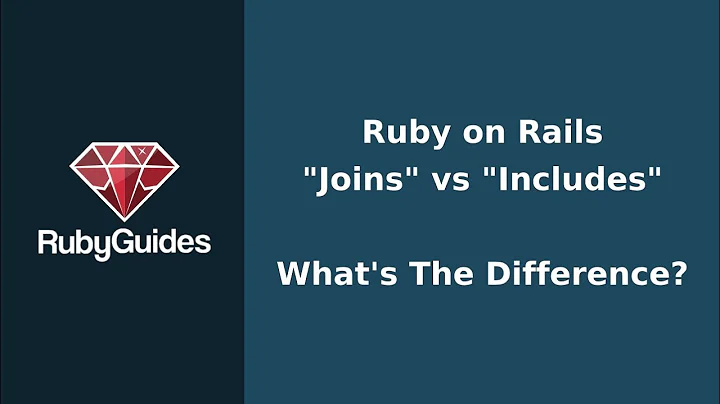LEFT OUTER JOIN in Rails 4
Solution 1
You can pass a string that is the join-sql too. eg joins("LEFT JOIN StudentEnrollment se ON c.id = se.course_id")
Though I'd use rails-standard table naming for clarity:
joins("LEFT JOIN student_enrollments ON courses.id = student_enrollments.course_id")
Solution 2
If anyone came here looking for a generic way to do a left outer join in Rails 5, you can use the #left_outer_joins function.
Multi-join example:
Ruby:
Source.
select('sources.id', 'count(metrics.id)').
left_outer_joins(:metrics).
joins(:port).
where('ports.auto_delete = ?', true).
group('sources.id').
having('count(metrics.id) = 0').
all
SQL:
SELECT sources.id, count(metrics.id)
FROM "sources"
INNER JOIN "ports" ON "ports"."id" = "sources"."port_id"
LEFT OUTER JOIN "metrics" ON "metrics"."source_id" = "sources"."id"
WHERE (ports.auto_delete = 't')
GROUP BY sources.id
HAVING (count(metrics.id) = 0)
ORDER BY "sources"."id" ASC
Solution 3
There is actually a "Rails Way" to do this.
You could use Arel, which is what Rails uses to construct queries for ActiveRecrods
I would wrap it in method so that you can call it nicely and pass in whatever argument you would like, something like:
class Course < ActiveRecord::Base
....
def left_join_student_enrollments(some_user)
courses = Course.arel_table
student_entrollments = StudentEnrollment.arel_table
enrollments = courses.join(student_enrollments, Arel::Nodes::OuterJoin).
on(courses[:id].eq(student_enrollments[:course_id])).
join_sources
joins(enrollments).where(
student_enrollments: {student_id: some_user.id, id: nil},
active: true
)
end
....
end
There is also the quick (and slightly dirty) way that many use
Course.eager_load(:students).where(
student_enrollments: {student_id: some_user.id, id: nil},
active: true
)
eager_load works great, it just has the "side effect" of loding models in memory that you might not need (like in your case)
Please see Rails ActiveRecord::QueryMethods .eager_load
It does exactly what you are asking in a neat way.
Solution 4
Combining includes and where results in ActiveRecord performing a LEFT OUTER JOIN behind the scenes (without the where this would generate the normal set of two queries).
So you could do something like:
Course.includes(:student_enrollments).where(student_enrollments: { course_id: nil })
Solution 5
Adding to the answer above, to use includes, if you want an OUTER JOIN without referencing the table in the where (like id being nil) or the reference is in a string you can use references. That would look like this:
Course.includes(:student_enrollments).references(:student_enrollments)
or
Course.includes(:student_enrollments).references(:student_enrollments).where('student_enrollments.id = ?', nil)
http://api.rubyonrails.org/classes/ActiveRecord/QueryMethods.html#method-i-references
Related videos on Youtube
Khanetor
Updated on October 24, 2020Comments
-
Khanetor over 3 years
I have 3 models:
class Student < ActiveRecord::Base has_many :student_enrollments, dependent: :destroy has_many :courses, through: :student_enrollments end class Course < ActiveRecord::Base has_many :student_enrollments, dependent: :destroy has_many :students, through: :student_enrollments end class StudentEnrollment < ActiveRecord::Base belongs_to :student belongs_to :course endI wish to query for a list of courses in the Courses table, that do not exist in the StudentEnrollments table that are associated with a certain student.
I found that perhaps Left Join is the way to go, but it seems that joins() in rails only accept a table as argument. The SQL query that I think would do what I want is:
SELECT * FROM Courses c LEFT JOIN StudentEnrollment se ON c.id = se.course_id WHERE se.id IS NULL AND se.student_id = <SOME_STUDENT_ID_VALUE> and c.active = trueHow do I execute this query the Rails 4 way?
Any input is appreciated.
-
PJSCopeland almost 6 yearsIf the record doesn't exist in StudentEnrollments, surely
se.student_id = <SOME_STUDENT_ID_VALUE>would be impossible?
-
-
Bhushan Kawadkar almost 10 yearsIt is better to add some explanation to your answer posted.
-
Khanetor almost 10 yearsMy solution ended up being: query = "LEFT JOIN student_enrollments ON courses.id = student_enrollments.course_id AND" + " student_enrollments.student_id = #{self.id}" courses = Course.active.joins(query) .where(student_enrollments: {id: nil}) It's not as Rails as I want it to be, though it gets the job done. I tried using .includes(), which does the LEFT JOIN, but it does not let me specify an extra condition on joining. Thanks Taryn!
-
Taryn East almost 10 yearsGreat. Hey, sometimes we do what we do to get it working. Time for coming back to it and making it better in the future... :)
-
mrbrdo over 8 yearsI just have to say I can't believe ActiveRecord still has no built-in support for this after so many years. It's completely unfathomable.
-
animatedgif about 8 yearsSooooo when can Sequel become the default ORM in Rails?
-
Adit Saxena almost 8 yearsRails shouldn't become bloated. Imo they got it right when they decided to extract gems out which were bundled by default in the first place. The philosophy is "do less but good" and "pick what you want"
-
 Murad Yusufov about 7 yearsRails 5 has support for LEFT OUTER JOIN: blog.bigbinary.com/2016/03/24/…
Murad Yusufov about 7 yearsRails 5 has support for LEFT OUTER JOIN: blog.bigbinary.com/2016/03/24/… -
 iNulty over 6 yearsSqueel is an unsupported library, not recommended
iNulty over 6 yearsSqueel is an unsupported library, not recommended -
textral over 6 yearsTo avoid eager_load's "side effect", see my answer
-
 Fangxing over 6 yearsThanks, I want to mention for cross association left outer joins, use
Fangxing over 6 yearsThanks, I want to mention for cross association left outer joins, useleft_outer_joins(a: [:b, :c]) -
 a2f0 over 5 yearsThis is interesting.
a2f0 over 5 yearsThis is interesting. -
 a2f0 over 5 yearsWill this work for a deeply nested relation or does the relation need to hang directly off the model being queried? I cant seem to find any examples of the former.
a2f0 over 5 yearsWill this work for a deeply nested relation or does the relation need to hang directly off the model being queried? I cant seem to find any examples of the former. -
 alexventuraio over 4 yearsAlso you have available
alexventuraio over 4 yearsAlso you have availableleft_joinsfor short and behave the same way. Eg.left_joins(:order_reports) -
 Andre Figueiredo over 4 years+1 but you can improve a little more and use
Andre Figueiredo over 4 years+1 but you can improve a little more and useselect(:id)instead ofpluck(:id)and prevent materializing inner query, and leaving it all to database. -
Joshua Pinter over 4 years@TarynEast "Make it work, make it fast, make it beautiful." :)
-
Volte over 4 yearsThe question is specifically targetting Rails 4.2.
-
RaphaMex about 4 yearsLove it! Just had to replace
joinsbyincludesand it did the trick. -
Lorin Thwaits almost 2 yearsLove this recursive solution!








![SAP ABAP Joins - Inner Join - Left Outer Join - Examples [english]](https://i.ytimg.com/vi/KykczIbaKr8/hqdefault.jpg?sqp=-oaymwEcCOADEI4CSFXyq4qpAw4IARUAAIhCGAFwAcABBg==&rs=AOn4CLACbmz_4rxpm1et7ZcbElQtcNcGLQ)
